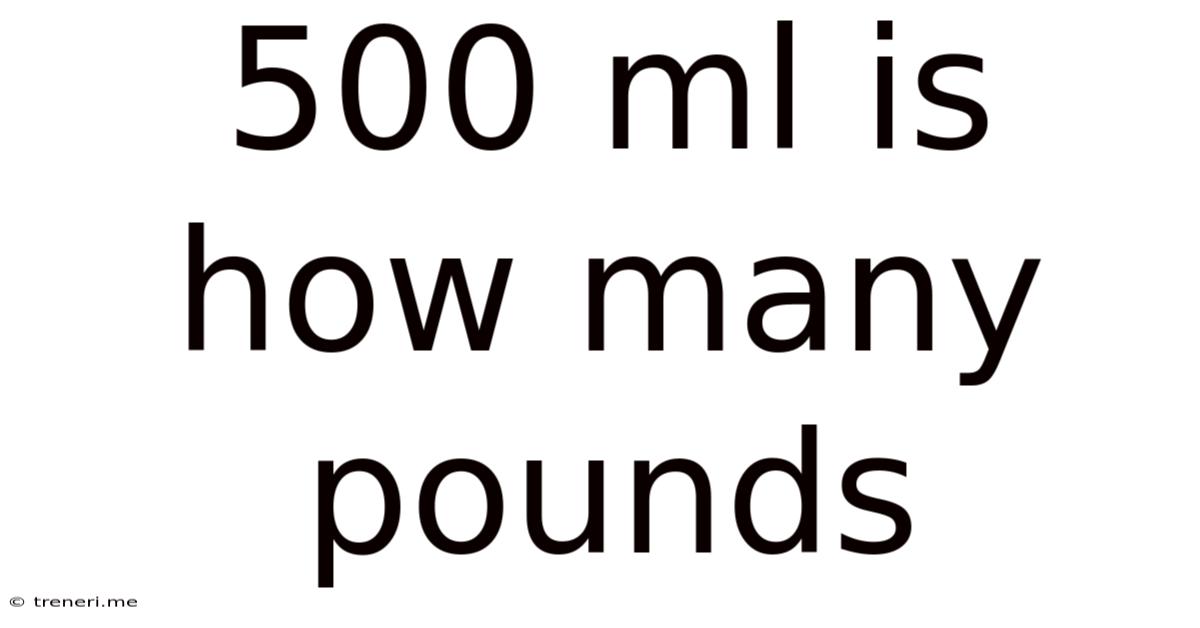500 Ml Is How Many Pounds
Treneri
May 13, 2025 · 4 min read

Table of Contents
500ml is How Many Pounds? Understanding Volume and Weight Conversions
Understanding the relationship between volume (measured in milliliters, or ml) and weight (measured in pounds, or lbs) is crucial in many aspects of life, from cooking and baking to shipping and scientific applications. The question, "500ml is how many pounds?" doesn't have a straightforward answer. This is because the weight of 500ml of a substance depends entirely on the density of that substance. Density is a measure of how much mass is contained in a given volume. Water, for example, has a different density than oil, which has a different density than mercury.
This article will delve into the complexities of this conversion, providing you with the tools and knowledge to accurately calculate the weight of 500ml of various substances. We will explore the concept of density, examine specific examples, and offer practical applications of this conversion process.
Understanding Density: The Key to the Conversion
The key to understanding how many pounds are in 500ml is density. Density is defined as mass per unit volume. The formula is:
Density = Mass / Volume
This means that if you know the density of a substance and its volume, you can calculate its mass. Conversely, if you know the mass and volume, you can calculate its density.
In our case, we know the volume (500ml). To find the weight (mass) in pounds, we need the density of the substance, which is usually expressed in grams per milliliter (g/ml) or kilograms per liter (kg/l). Once we have the density, we can perform the conversion using several steps.
Converting Units: From Milliliters and Grams to Pounds
The conversion process typically involves several steps:
-
Determine the density: Find the density of the substance you're working with. You can often find this information online or in scientific handbooks.
-
Calculate the mass in grams: Use the density formula (Mass = Density x Volume) to calculate the mass of the substance in grams. Remember that 500ml is equal to 500 cubic centimeters (cc).
-
Convert grams to pounds: There are approximately 453.592 grams in one pound. Therefore, divide the mass in grams by 453.592 to get the mass in pounds.
Let's look at some examples to illustrate this process.
Examples: Calculating the Weight of 500ml of Different Substances
Example 1: Water
Water has a density of approximately 1 g/ml. Let's calculate the weight of 500ml of water in pounds:
-
Density: 1 g/ml
-
Mass in grams: Mass = 1 g/ml * 500 ml = 500 g
-
Mass in pounds: 500 g / 453.592 g/lb ≈ 1.102 lbs
Therefore, 500ml of water weighs approximately 1.102 pounds.
Example 2: Cooking Oil
Cooking oil has a slightly lower density than water, typically around 0.92 g/ml. Let's calculate the weight of 500ml of cooking oil in pounds:
-
Density: 0.92 g/ml
-
Mass in grams: Mass = 0.92 g/ml * 500 ml = 460 g
-
Mass in pounds: 460 g / 453.592 g/lb ≈ 1.014 lbs
Therefore, 500ml of cooking oil weighs approximately 1.014 pounds.
Example 3: Mercury
Mercury is a much denser liquid than water or oil. Its density is approximately 13.6 g/ml. Let's calculate the weight of 500ml of mercury in pounds:
-
Density: 13.6 g/ml
-
Mass in grams: Mass = 13.6 g/ml * 500 ml = 6800 g
-
Mass in pounds: 6800 g / 453.592 g/lb ≈ 15 lbs
Therefore, 500ml of mercury weighs approximately 15 pounds.
These examples highlight the significant difference in weight for the same volume (500ml) due to variations in density.
Practical Applications and Considerations
Understanding the relationship between volume and weight is vital in many real-world situations:
-
Cooking and Baking: Recipes often require specific weights of ingredients. Knowing the density of ingredients allows you to convert volumes to weights for accurate measurements.
-
Shipping and Logistics: Shipping companies often charge based on weight. Knowing the weight of your goods is essential for calculating shipping costs.
-
Scientific Research: Accurate weight measurements are crucial in many scientific experiments and analyses.
-
Fluid Mechanics: Density is a fundamental parameter in fluid mechanics, influencing properties like buoyancy and flow.
Important Considerations:
-
Temperature: Density can be affected by temperature. The densities provided above are approximate and can vary slightly depending on the temperature.
-
Purity: The purity of a substance can also affect its density. Impurities can alter the mass and therefore the weight.
-
Accuracy: The accuracy of your calculations depends on the accuracy of the density measurement you use.
Conclusion: Beyond a Simple Answer
The question "500ml is how many pounds?" doesn't have a single answer. The weight depends heavily on the density of the substance in question. By understanding the concept of density and applying the appropriate conversion formulas, you can accurately determine the weight of 500ml of any substance. Remember to always use accurate density values and consider factors like temperature and purity for the most precise results. This knowledge is crucial in a variety of applications, from everyday cooking to scientific research and logistics. This comprehensive understanding empowers you to tackle similar volume-to-weight conversions confidently and accurately.
Latest Posts
Latest Posts
-
How Many Cups On 32 Oz
May 14, 2025
-
Born 1991 How Old Am I
May 14, 2025
-
Como Se Calcula El Metro Cuadrado
May 14, 2025
-
What Is Time And A Half For 13 An Hour
May 14, 2025
-
How Big Is A 20 In Pizza
May 14, 2025
Related Post
Thank you for visiting our website which covers about 500 Ml Is How Many Pounds . We hope the information provided has been useful to you. Feel free to contact us if you have any questions or need further assistance. See you next time and don't miss to bookmark.